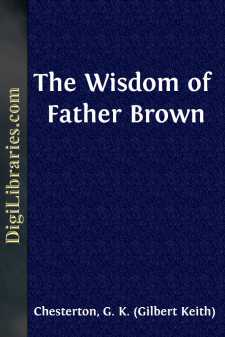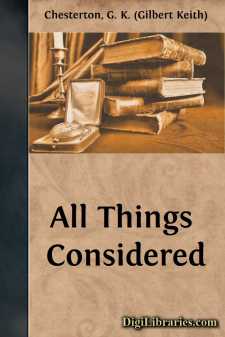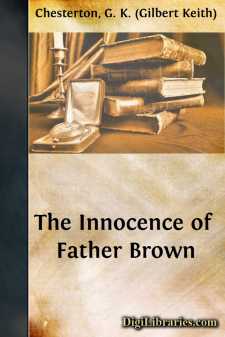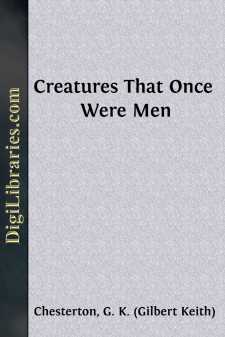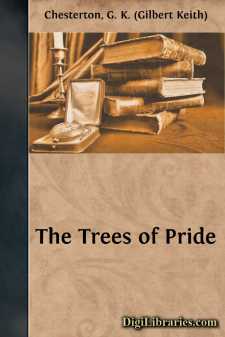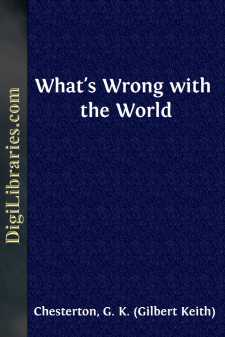Categories
- Antiques & Collectibles 13
- Architecture 36
- Art 48
- Bibles 22
- Biography & Autobiography 813
- Body, Mind & Spirit 142
- Business & Economics 28
- Children's Books 17
- Children's Fiction 14
- Computers 4
- Cooking 94
- Crafts & Hobbies 4
- Drama 346
- Education 46
- Family & Relationships 57
- Fiction 11829
- Games 19
- Gardening 17
- Health & Fitness 34
- History 1377
- House & Home 1
- Humor 147
- Juvenile Fiction 1873
- Juvenile Nonfiction 202
- Language Arts & Disciplines 88
- Law 16
- Literary Collections 686
- Literary Criticism 179
- Mathematics 13
- Medical 41
- Music 40
- Nature 179
- Non-Classifiable 1768
- Performing Arts 7
- Periodicals 1453
- Philosophy 64
- Photography 2
- Poetry 896
- Political Science 203
- Psychology 42
- Reference 154
- Religion 513
- Science 126
- Self-Help 84
- Social Science 81
- Sports & Recreation 34
- Study Aids 3
- Technology & Engineering 59
- Transportation 23
- Travel 463
- True Crime 29
G. K. (Gilbert Keith) Chesterton
Gilbert Keith Chesterton, often referred to as G.K. Chesterton, was an English writer, philosopher, and critic born on May 29, 1874. Renowned for his witty and insightful prose, he authored the popular "Father Brown" detective series and numerous essays on various topics, including literature, politics, and theology. His works, such as "Orthodoxy" and "The Everlasting Man," have had a lasting influence on Christian apologetics and literary criticism.
Author's Books:
Sort by:
Chapter I How the Great Wind Came to Beacon House A wind sprang high in the west, like a wave of unreasonable happiness, and tore eastward across England, trailing with it the frosty scent of forests and the cold intoxication of the sea. In a million holes and corners it refreshed a man like a flagon, and astonished him like a blow. In the inmost chambers of intricate and embowered houses it woke like...
more...
ONE — The Absence of Mr Glass THE consulting-rooms of Dr Orion Hood, the eminent criminologist and specialist in certain moral disorders, lay along the sea-front at Scarborough, in a series of very large and well-lighted french windows, which showed the North Sea like one endless outer wall of blue-green marble. In such a place the sea had something of the monotony of a blue-green dado: for the...
more...
DEAR PROFESSOR WHIRLWIND, Your name in the original German is too much for me; and this is the nearest I propose to get to it: but under the majestic image of pure wind marching in a movement wholly circular I seem to see, as in a vision, something of your mind. But the grand isolation of your thoughts leads you to express them in such words as are gratifying to yourself, and have an inconspicuous or...
more...
A DEDICATION TO E.C.B. He was, through boyhood's storm and shower, My best, my nearest friend; We wore one hat, smoked one cigar, One standing at each end. We were two hearts with single hope, Two faces in one hood; I knew the secrets of his youth; I watched his every mood. The little things that none but I Saw were beyond his wont, The streaming hair, the tie behind, The coat tails worn in front....
more...
THE CASE FOR THE EPHEMERAL I cannot understand the people who take literature seriously; but I can love them, and I do. Out of my love I warn them to keep clear of this book. It is a collection of crude and shapeless papers upon current or rather flying subjects; and they must be published pretty much as they stand. They were written, as a rule, at the last moment; they were handed in the moment before...
more...
CHAPTER I. THE TWO POETS OF SAFFRON PARK THE suburb of Saffron Park lay on the sunset side of London, as red and ragged as a cloud of sunset. It was built of a bright brick throughout; its sky-line was fantastic, and even its ground plan was wild. It had been the outburst of a speculative builder, faintly tinged with art, who called its architecture sometimes Elizabethan and sometimes Queen Anne,...
more...
The Blue Cross Between the silver ribbon of morning and the green glittering ribbon of sea, the boat touched Harwich and let loose a swarm of folk like flies, among whom the man we must follow was by no means conspicuous—nor wished to be. There was nothing notable about him, except a slight contrast between the holiday gaiety of his clothes and the official gravity of his face. His clothes included a...
more...
It is certainly a curious fact that so many of the voices of what is called our modern religion have come from countries which are not only simple, but may even be called barbaric. A nation like Norway has a great realistic drama without having ever had either a great classical drama or a great romantic drama. A nation like Russia makes us feel its modern fiction when we have never felt its ancient...
more...
I. THE TALE OF THE PEACOCK TREES Squire Vane was an elderly schoolboy of English education and Irish extraction. His English education, at one of the great public schools, had preserved his intellect perfectly and permanently at the stage of boyhood. But his Irish extraction subconsciously upset in him the proper solemnity of an old boy, and sometimes gave him back the brighter outlook of a naughty...
more...
I. THE MEDICAL MISTAKE A book of modern social inquiry has a shape that is somewhat sharply defined. It begins as a rule with an analysis, with statistics, tables of population, decrease of crime among Congregationalists, growth of hysteria among policemen, and similar ascertained facts; it ends with a chapter that is generally called "The Remedy." It is almost wholly due to this careful,...
more...



